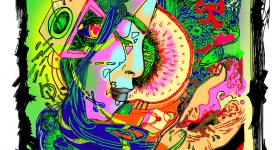Sreshtha Sen's ability to honor the formal traditions of both the ghazal and sonnet while bringing both forms to the forefront of contemporary American poetry for a fresh readership is matched only by her ability to navigate and fuse more complex opposites — history vs. present, Urdu vs. English, history vs. mythology, colonialism vs. autonomy.
— Marci Calabretta Cancio-Bello, Poetry Editor
Anarkali Disco Chali
On Tuesday, Ghazal awoke in sheets of English,
broke Urdu into italics: There is just one
tale translated through the “Beloved” in English.
Shahid tried. Lips he once wooed across oceans run
back to sing, clamoring to be free from English.
Like Anarkali, trapped brick by slow brick in fear
exhales (They do not hear. They’ll only hear English.)
the sky trembles on rooftops, you think you hear
stutters but she will never return to English.
When you try to investigate this gape, remember —
more tongues were torn (trying) to conquer her, before English.
Tuesday, Ghazal rose as Faiz’s ghost before censure.
Sreshtha, do not be this lover (you never were), mourning loss in anguish.
Here, write a sonnet instead, crisp and white in its English.
Author's Note: Anarkali was a courtesan believed to have been buried to death between two walls by Akbar for her relationship with the crown prince Jahangir. Title borrowed from a Bollywood Song literally translated to “Anarkali has left for the disco” implying a fusion of the traditional (Anarkali) with the modern (Disco).










Comments